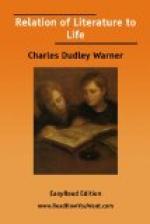This is what constitutes the enduring charm of the best of these pictures of travel which Warner produced. It is perhaps misleading to assert that they do not furnish a good deal of information. Still it is not the sort of information which the ordinary tourist gives and which the cultivated reader resents and is careful not to remember. Their dominant note is rather the quiet humor of a delightful story-teller, who cannot fail to say something of interest because he has seen so much; and who out of his wide and varied observation selects for recital certain sights he has witnessed, certain experiences he has gone through, and so relates them that the way the thing is told is even more interesting than the thing told. The chief value of these works does not accordingly depend upon the accidental, which passes. Inns change and become better or worse. Facilities for transportation increase or decrease. Scenery itself alters to some extent under the operation of agencies brought to bear upon it for its own improvement or for the improvement of something else. But man’s nature remains a constant quantity. Traits seen here and now are sure to be met with somewhere else, and even in ages to come. Hence works of this nature, embodying descriptions of men and manners, always retain something of the freshness which characterized them on the day of their appearance.
Of these productions in which the personal element predominates, and where the necessity of intruding information is not felt as a burden, those of Warner’s works which deal with the Orient take the first rank. The two—“My Winter on the Nile” and “In the Levant”—constitute the record of a visit to the East during the years 1875 and 1876.
They would naturally have of themselves the most permanent value, inasmuch as the countries described have for most educated men an abiding interest. The lifelike representation and graphic characterization which Warner was apt to display in his traveling sketches were here seen at their best, because nowhere else did he find the task of description more congenial. Alike the gorgeousness and the squalor of the Orient appealed to his artistic sympathies. Egypt in particular had for him always a special fascination. Twice he visited it—at the time just mentioned and again in the winter of 1881-82. He rejoiced in every effort made to dispel the obscurity which hung over its early history. No one, outside of the men most immediately concerned, took a deeper interest than he in the work of the Egyptian Exploration Society, of which he was one of the American vice-presidents. To promoting its success he gave no small share of time and attention. Everything connected with either the past or the present of the country had for him an attraction. A civilization which had been flourishing for centuries, when the founder of Israel was a wandering sheik on the Syrian plains or in the hill-country of Canaan; the slow unraveling of records of dynasties of forgotten kings; the memorials of Egypt’s vanished greatness and the vision of her future prosperity these and things similar to these made this country, so peculiarly the gift of the Nile, of fascinating interest to the modern traveler who saw the same sights which had met the eyes of Herodotus nearly twenty-five hundred years before.




